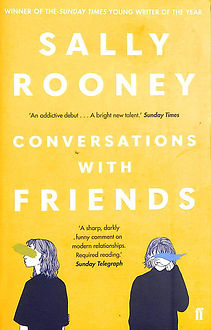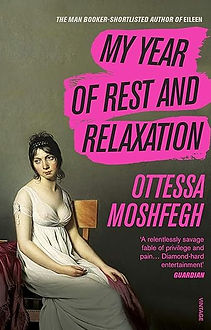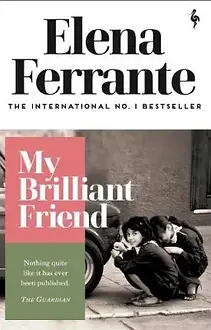
Book Recommendations for women
Discover our curated list of titles that explore the rich and diverse themes of womanhood. Here, you will find a mix both non-fiction and fiction works that delve into the unique experiences, challenges, and triumphs of being a woman. Whether you're seeking inspiration, insight, or simply a good read, these selections offer a variety of perspectives on the female experience.
On This Page

no1 book recommendation
A profound and lyrical exploration of modern womanhood, freedom, and the courage to rewrite life's script.
In The Cost of Living, celebrated author Deborah Levy delves into the intricate dimensions of love, loss, marriage, and kinship, all while offering a raw critique of societal roles assigned to women. This book is the second installment in her “living autobiography,” following Things I Don’t Want to Know. Known for her razor-sharp prose and profound insights, Levy takes us through a period of personal upheaval—the end of her marriage, the death of her mother, and the reimagining of what it means to live with authenticity, freedom, and joy.
Levy, a two-time Man Booker Prize finalist, is no stranger to examining the nuanced layers of the human experience. With a career that spans novels, plays, and essays, her literary voice is both distinctive and resonant. From her early works like Beautiful Mutants to her Booker-shortlisted Hot Milk and Swimming Home, Levy has consistently explored themes of identity, displacement, and the politics of everyday life. The Cost of Living continues this trajectory, but with a deeply personal lens.
The book is a manifesto for modern womanhood, exposing the silent erasure of women’s names, spaces, and stories. Levy uses her own experiences to unravel the myths surrounding “The Family House,” where the comfort of men and children often comes at the expense of women’s desires and agency. Stripping away the wallpaper of societal expectations, she reveals the toll of these sacrifices—a woman left unthanked, unloved, and exhausted.
Levy’s prose is precise and unflinching, yet infused with warmth and humor. Her reflections on the act of homemaking, which she describes as a form of empathy and generosity, are especially poignant. Renting a shed from the widow of poet Adrian Mitchell, she transforms it into “a shed of one’s own,” echoing Virginia Woolf’s call for women to carve out spaces for their creativity. This shed becomes a character in its own right, emblematic of Levy’s journey toward freedom and self-definition.
What makes The Cost of Living so compelling is Levy’s ability to weave the personal with the universal. She recounts encounters with women from different walks of life: a young traveler deflecting a man’s advances, a brilliant student grappling with societal expectations, and an octogenarian bookseller whose sharp wit offers wisdom and solace. These vignettes illuminate the shared struggles and triumphs of women navigating a world not built for their advantage.
Levy’s writing is shorn of excess, carrying its emotional weight with a simplicity that makes her observations all the more profound. Beneath the surface of her elegant prose lies a simmering rage—a quiet rebellion against the boundaries imposed by gendered rituals and hierarchies. Yet, this is not a book of despair. It is a celebration of the courage it takes to reimagine one’s life and the exhilaration of finding new ways to live with value and meaning.
The Cost of Living is a book for our turbulent times, a crystalline reflection on what it means to live authentically as a woman. Levy’s journey is both deeply personal and universally resonant, making this memoir an essential read for anyone seeking to understand the complex dynamics of modern womanhood.
In a world that often casts women as minor characters, Deborah Levy refuses to be sidelined. With her unyielding honesty and lyrical prose, she shows us what it costs to rewrite the script—and why it is worth every ounce of courage.
If you want to support the site, please use one of the links below to buy from one of our affiliated partners.

no2 book recommendation
A Haunting Masterpiece of the Mind
Sylvia Plath’s The Bell Jar is an unflinching, semi-autobiographical portrait of a young woman’s unraveling. Published under the pseudonym Victoria Lucas in 1963, mere weeks before Plath’s tragic death, this singular novel delves into the inner workings of Esther Greenwood, a bright, ambitious woman whose promising life is overshadowed by societal constraints and her own mental anguish.
Set in the suffocating cultural confines of the 1950s, the story begins with Esther’s prestigious magazine internship in New York City—a moment of opportunity that soon curdles into disillusionment. Struggling to reconcile her ambitions with the expectations of womanhood, she faces academic disappointment, romantic hypocrisy, and the relentless pressure to conform to marriage and motherhood. Esther’s eventual breakdown, marked by a failed suicide attempt and brutal psychiatric treatments, becomes the lens through which Plath explores identity, gender, and the fragile boundary between sanity and madness.
Plath’s prose, sharp as a shard of glass, captures Esther’s descent with an intensity that is both harrowing and profoundly empathetic. Readers are drawn into Esther’s despair, feeling the stifling weight of the titular “bell jar”—a suffocating metaphor for mental illness and societal oppression. The novel’s brilliance lies not only in its vivid imagery and emotional honesty but also in its ability to resonate universally, decades after its publication.
The Bell Jar is more than a tale of personal suffering; it’s a cultural critique and a feminist rallying cry. Plath’s unyielding portrayal of a woman’s struggle against the roles imposed upon her was ahead of its time, making this novel a cornerstone of modern literature.
Through Esther, Plath speaks for anyone who has ever felt trapped, and her searing exploration of mental health remains as relevant today as it was over half a century ago. The Bell Jar is an essential read—a haunting, lyrical masterpiece that continues to illuminate the complexities of the human psyche and the often invisible chains of societal expectations.

no3 book recommendation
A Wickedly Dark, Hilarious Exploration of Family Loyalty, Guilt, and the Thrills of Murder
Oyinkan Braithwaite's debut novel My Sister, The Serial Killer is a wickedly funny and sharply observant exploration of family, loyalty, and the darkly absurd. Set against the vibrant backdrop of Lagos, this brilliant black comedy follows Korede, a dutiful and efficient nurse, who has become all too familiar with the aftermath of her younger sister Ayoola's violent, yet oddly justified, murders.
The novel’s title is both shocking and fitting, and Braithwaite deftly balances humor with horror, giving the reader a glimpse into the complex relationship between two sisters who have more secrets than they can manage. Korede's devotion to her beautiful, manipulative sister is tested when Ayoola begins to pursue Korede's longtime crush, a charming doctor. Torn between love and loyalty, Korede must decide how far she will go to protect her sister, even as her own personal feelings collide with the gruesome reality of Ayoola's actions.
Braithwaite's writing is razor-sharp, her humor dark, and the twists and turns of this story will leave you both laughing and cringing. A masterwork of modern fiction, My Sister, The Serial Killer is a must-read for anyone who loves an unconventional narrative that never fails to surprise.

no4 book recommendation
An Intellectually Charged Exploration of Youth, Desire, and the Unpredictable Tangles of Friendship
Sally Rooney’s debut novel, Conversations with Friends, is a sharply intelligent and emotionally incisive exploration of friendship, lust, jealousy, and the unexpected complexities of adulthood. At the heart of the story is Frances, a 21-year-old aspiring writer and college student in Dublin, who, along with her best friend Bobbi, finds herself caught in a strange and complicated web of relationships that blur the lines between intimacy and detachment.
Frances and Bobbi, once lovers, now perform spoken-word poetry together, navigating their evolving dynamic while grappling with their own identities. The two women are drawn into the sophisticated orbit of Melissa, a successful journalist, and her husband, Nick, a handsome actor whose own life has never quite lived up to expectations. Initially, Frances views Nick as an embodiment of patriarchal complacency, but as the two grow closer, their flirtation unexpectedly deepens, forcing Frances to confront her vulnerabilities and desires for the first time.
Rooney’s writing is marked by its sharp wit, dark humor, and an uncanny ability to capture the messiness of human relationships. Frances, cool-headed and introspective, serves as a compelling narrator, but it is her internal contradictions—her emotional restraint mixed with a growing need for connection—that make her such a fascinating character. Through her, Rooney explores the complexities of female friendship, love, and the painful self-awareness that comes with intimacy.
The novel is a striking portrait of the pleasures and dangers of youth, as well as a candid look at the emotional and intellectual struggles that define personal growth. Rooney doesn’t shy away from depicting the subtle power dynamics, jealousy, and emotional turmoil that often underpin friendships and romantic entanglements, particularly in the context of class and gender. As Frances becomes entangled in her relationships with Nick, Melissa, and Bobbi, her intellectual certainties are gradually replaced by a raw, uncharted experience of the body and emotion.
Conversations with Friends is a finely crafted novel, alive with the tensions that arise when intellectual detachment gives way to emotional engagement. With its witty dialogue and keen observations on the intricacies of modern relationships, it marks Rooney as a significant voice in contemporary fiction. Whether you’re drawn to its exploration of intimate relationships or its portrayal of youthful uncertainty, the novel will resonate long after the final page. A striking debut from a writer who has already proven herself to be one of the defining literary voices of her generation, Conversations with Friends is an exhilarating, thought-provoking read.

no5 book recommendation
An Unflinching, Darkly Comedic Exploration of Alienation, Privilege, and the Struggles of Escaping Life
Ottessa Moshfegh’s My Year of Rest and Relaxation is a darkly comedic exploration of privilege, alienation, and the disillusionment that comes with living a life seemingly filled with every material comfort. The novel follows an unnamed narrator—a young, beautiful, and wealthy woman living in New York City at the dawn of the 21st century—who embarks on a year-long experiment in self-imposed hibernation. Armed with an absurd cocktail of prescription drugs from a reckless psychiatrist, she attempts to sleep away her discontent with the world and herself.
Despite her outwardly perfect life—a posh Upper East Side apartment, a degree from Columbia, and financial security from her inheritance—our narrator is deeply disconnected. The loss of her parents, a failed relationship with a Wall Street boyfriend, and a toxic, sadomasochistic friendship with her best friend Reva leave her detached, apathetic, and seeking a way to escape the banality of existence. The world, she believes, is overrated, and sleep, the only way to truly detach from it, becomes her solace. Moshfegh’s writing delves into this emotional vacancy with a sharp, sardonic wit, building a narrator who is both cruelly funny and achingly honest in her disdain for life.
The beauty of My Year of Rest and Relaxation lies in Moshfegh’s unapologetic exploration of her character's nihilism. The narrator's glib observations on the absurdities of modern life, as well as her interactions with the people around her—Reva, Trevor, and even the bizarre psychiatrist Dr. Tuttle—are laced with caustic humor. Yet, beneath the humor is a deep commentary on the hollow nature of privilege and the disconnect it breeds. The narrator’s wealth and status offer no protection from the inner emptiness she feels, and Moshfegh deftly uses her character’s apathy to explore themes of isolation, grief, and the stifling effects of living in an overly commodified world.
Despite her attempts to sleep through life, the narrator’s year of rest does not deliver the peace she so desperately seeks. As her drug-induced stupor drags on, she is confronted with the raw realities of her existence. The novel’s setting—New York City at the turn of the millennium—adds another layer of dark humor, as Moshfegh places her protagonist on the brink of the cultural upheaval that would be 9/11, without the character ever truly engaging with the world outside her personal bubble.
Ultimately, My Year of Rest and Relaxation is a strikingly intelligent and deeply disturbing novel about the ways in which we numb ourselves to the pain of living. It is a narrative that is simultaneously absurd and devastating, showcasing Ottessa Moshfegh’s unrivaled skill in capturing the contradictions of modern existence. Her portrayal of the narrator’s search for oblivion, and the painful self-awareness that emerges from it, offers both a dark comedy and a poignant meditation on the limits of escape.
Moshfegh’s talent is undeniable in this novel—her writing is sharp, darkly humorous, and compassionate in its merciless examination of the human condition. With My Year of Rest and Relaxation, Moshfegh has cemented herself as one of the most compelling and original voices in contemporary literature, offering readers a story that is as thought-provoking as it is unsettling.

no6 book recommendation
A Hilarious, Raw Exploration of Friendship, Self-Destruction, and the Struggle to Grow Up
Emma Jane Unsworth’s Animals is a fierce, unapologetic dive into the chaos of youth, friendship, and the inevitable clash with adulthood. At the heart of this raucous novel are Laura and Tyler, two women who have spent the last decade living life on their own terms—endless parties, drug binges, and a general disregard for anything resembling responsibility. Together, they’ve formed an inseparable bond, a friendship founded on mutual self-destruction, but the time has come for Laura to face a choice.
When Laura gets engaged to Jim, a responsible and teetotal classical pianist, Tyler’s reckless presence becomes an obstacle to the life Jim envisions for Laura. While Jim pulls her towards a more “appropriate” future, Tyler fights to keep their shared hedonistic lifestyle intact. But as the wedding looms closer, Laura must confront the reality of growing up and decide what she’s willing to leave behind to step into the next phase of her life.
Unsworth’s sharp, witty prose brings these two women to life, and Animals is as much about the inevitability of change as it is about the complexities of human connection. The novel’s uproarious humor contrasts with the deep emotional stakes of Laura’s dilemma. Animals speaks to a generation stuck between the end of their twenties and the start of adulthood, asking the question: How do we grow up without losing the essence of who we are?
With a blend of laugh-out-loud moments, poignant reflection, and biting insight, Animals is a raw and relatable tale of friendship, identity, and the difficulty of letting go.

no7 book recommendation
A Gripping Portrait of Friendship, Rivalry, and the Transformative Power of Time
Elena Ferrante’s My Brilliant Friend is a breathtaking exploration of friendship, ambition, and identity that unfolds within the vibrant, yet challenging streets of 1950s Naples. At the heart of the novel are Elena Greco and Lila Cerullo, two young girls whose lives are intricately intertwined as they navigate the turbulent landscape of adolescence, gender, and class. Their deep bond forms the backbone of the story, one that transcends simple friendship and evolves into a profound rivalry, with each woman’s destiny reflecting and refracting the other’s.
Set against the backdrop of a poor but dynamic neighborhood, My Brilliant Friend explores not only the individual lives of Elena and Lila but also the sweeping changes in Italy during the post-war years. Through their personal journeys, Ferrante deftly paints a portrait of a nation in flux—one that transforms its people as much as they, in turn, shape it. Elena, the "porter’s daughter," is academically inclined and determined to pursue education, while Lila, the rebellious shoemaker’s daughter, is both enigmatic and fiercely intelligent but constrained by her circumstances. As their paths diverge, the tension between them grows, revealing the complexities of ambition, social expectations, and the constraints of gender.
What makes My Brilliant Friend truly remarkable is Ferrante’s unflinching exploration of female friendship. Far from romanticizing the bond between Elena and Lila, Ferrante delves into the darker, often painful aspects of their relationship. Their friendship is both a source of strength and a catalyst for rivalry, jealousy, and self-doubt. Ferrante’s prose is intimate and insightful, capturing the emotional landscape of these two women with clarity and nuance, making their journey both universal and intensely personal.
In My Brilliant Friend, Ferrante invites readers into a world where the boundaries between friendship, love, and competition blur, and where the process of growing up is both exhilarating and excruciating. This first book in Ferrante’s Neapolitan Novels is a modern masterpiece—rich in detail, emotionally complex, and impossible to put down. It is a stunning portrait of two women whose destinies are forever altered by the shifting forces of time, class, and their inextricable connection to each other.